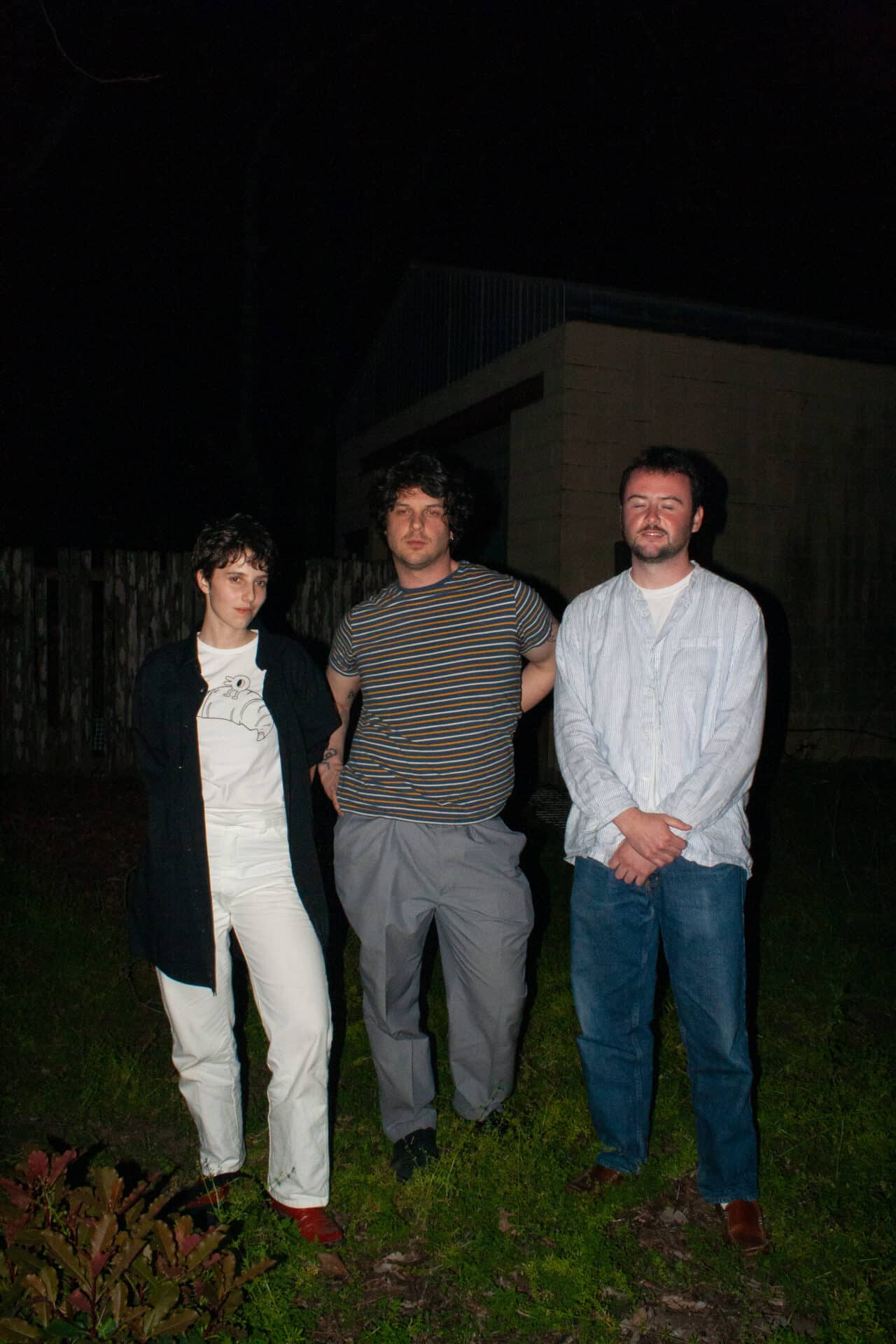BY: Claire Borgelt

Amiture emerged as a solo project in 2021, featuring the fierce electronic work of Jack Whitescarver. However, the introduction of heavy, hazy guitar tracks from Coco Gaupil on their intense sophomore album, Mother Engine marks the beginnings of a powerful collaboration. We caught up with the duo and their live bassist, Max Beirne Shafer, in Austin where they performed at New York-based record label Dots Per Inch's late-night showcase.
This interview has been edited for length and clarity.
Are there any artists who you feel have really influenced your outlook on creativity or art in general?
Jack: I feel like I've always been really inspired by music from New York, like Glenn Branca and older hip hop from the late ‘80s. I think a really big person for me was this artist and Barbara Ess, who was my teacher in college. She's a musician and an artist, and she taught me how to do it very seriously. She's very good. I think everyone should look into her. She had a band called Y Pants. They only played toy instruments. It's amazing.
Coco: I think I'm really influenced by country singers, even though I play guitar. And just the penchant for storytelling. I appreciate the way they talk about things that are sometimes banal, but also what's real. I really listen a lot to Emmylou Harris and Guy Clark, and Townes Van Zandt. There's definitely a country feel to our album, but that's not always immediately apparent to everyone who listens.
Max: I really like the Beach Boys!
It seems like you both have a pretty extensive history in the visual arts. Do you feel those creative endeavors have influenced the way you go about making music at all?
Coco: For me, at least I feel like the guitar is an instrument that's kind of in the middle. I think of it sculpturally in the sense that it scaffolds the vocals and the percussion that go on around it. To me, it feels like a physical medium in that way. You know, music fills space in a tangible way.
Jack: There's a little crossover for me, but I feel like they're also pretty different. I think that art has a really different set of concerns. When I'm performing, I feel like I'm like it's kind of important for me to think of it as a very singular task in order to do it well. I feel like with art, you're waiting for people to come in and look at it. With music, you're putting it in front of people continuously. Music is definitely more of like a like a way of like a way of a way to engage with people more directly.
I know that Amiture was initially solo project. I was wondering how the collaboration came about in a more permanent form. Do you have any moments specifically where you knew that this was going to go beyond a couple reworkings of the songs?
Jack: Yeah, it was like it was an extremely sort of unserious thing at first. A lot of it happened during the pandemic. When I was trying to figure out how to make those older songs work live, I was just tired of doing it by myself. I asked Coco to help with guitar arrangements, and as we worked on it we decided we should just figure it out as a true collaboration. We stopped working on those old songs pretty fast. And it continued with Max. The way that Amiture has transformed live feels like it just keeps expanding. We really, really started very small. And now there's no boundary to who's a part of it.
Coco: The arrangements take on a life of their own. It's kind of interesting to re-explore a song that we wrote previously. You know, Jack and I first started playing when we were in college. We were kind of in this messy noise band. That's the root of it.
So when you're putting things together these days you're really thinking about how it'll sound live?
Coco: Yeah, exclusively about the performance of it, yeah.
I was also interested in the story of the place where you recorded Mother Engine. It was a garage, right? Yeah. How do you feel that being in that setting influenced the sound you ended up with?
Jack: Hugely, because we were very much very much alone. For like, a whole year. We were in a very specific landscape, the Hudson Valley. It was originally Coco's art studio, and then I moved up there so we rented it together as an art studio. We just ended up turning it into a music studio.
Coco: We kind of started playing over Jack's stuff for The Beach. After five o'clock, we could be as loud as we liked, even though wasn't really situated for music. It was all concrete. I feel like it was a little bit depressing. And in a very desolate area that made it possible to play to a lot of the larger thematic motifs that each of us independently were working through. But yeah, it was kind of a funny zone. There was an abandoned radio station on the corner and a garbage truck depot on the other side. It was kind of scary at night, not because anything bad was happening, but just because no one was there. Something about that was so inhospitable. We would close the door and it was just a complete world, I guess.
On the subject of Mother Engine, I was really interested in the way that you put together “Billy's Dream.” You described the process for that song as distilling a longer jam session into a single track. I was wondering how that process came about. What inspired you just take that approach to it?
Jack: It wasn't very deliberate. It was just kind of like we we were listening to what we'd done in a recording session. Coco spent a lot of time creating these really dense guitar scapes. We were able to create that sort of collage after the fact. That's like a very good emblematic song for the album because it speaks to the way that a lot of it was created. We would jam for literally hours. Seven or eight hours. Then we'd find little tidbit and build the songs from there.
Coco: It speaks to the isolation of that moment, you know, where Jack was really going into this process of finding existing beats, sampling them and then having a friend of ours, Matt Norman, recreate them. Or you know, we'd be doing these jams and record some of that and then sample them. It becomes this really dense thing. I feel like Jack and I both aren't necessarily maximalists, but we were both really into making this long form album and spending a really long time with it.
What's your favorite track to play live?
Jack: Right now, it's “Baby.”
Coco: Jack just had this idea to add a part to “Baby” where we slow down at the end. It's just kind of nasty. I love it. Whatever's fresh at the moment becomes the most fun to play.
Max: I like “American Flag.” I think that one's been pretty interesting. It's fun to try and shape it. Every time there's a lot of room for me to mess around it's fun.
Jack: The bass is really important. So much of the structure of the songs comes from those grooves. It's been really good to have like a live bass to push that further.
Amiture on Spotify:

